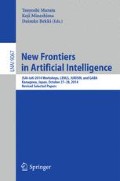Abstract
This paper deals with a different behavior of weak necessity modals (in Japanese, hazu) in comparison with plain necessity or possibility modals in their epistemic use. While the latter cannot be immediately followed by the negation of its prejacent, the former allows this. After reviewing some previous approaches to this fact in Kratzerian framework, we try to implement [14]’s insight in terms of an update semantics by [15], modified by [13]. We propose that hazu makes a (possibly) counterfactual update by revising CG with normalcy condition.
We would like to thank Yusuke Kubota, Takumi Tagawa, Misato Ido, Katsumasa Ito, Hitomi Hirayama, Chunhong Park, Saori Takayanagi, Akitaka Yamada and three anonymous reviewers and participants of LENLS 11 for their insightful comments and discussions. This work was supported by JSPS Grant-in-Aid for JSPS Fellows Grant Number 25-9444.
Access this chapter
Tax calculation will be finalised at checkout
Purchases are for personal use only
Notes
- 1.
Abbreviations used in this paper are as follows: Conj = conjunction, Cop = copula, Loc = locative, Neg = negation, Nom = nominative, Pres = present, Result = resultative, Top = topic.
- 2.
We will often refer to the large intersection of a modal base, that is, a set of worlds in which all the propositions in the modal base hold, as a modal base, when there is no chance of misunderstanding.
- 3.
In this paper, we will make the Limit Assumption ([9]) for simplicity’s sake because nothing hinges on the assumption.
- 4.
- 5.
This might not be a valid counterargument when one takes [10]’s strong view that all epistemic modals contribute their own evidential semantics (and all evidentials contribute modal semantics) and follows her in regarding the direct perceptual evidence and the general knowledge as forming a natural class based on “trustworthiness”.
- 6.
- 7.
See [14] for arguments for this difference in presupposition.
- 8.
\(Best_{g(w)} (\cap f(w)) = \{w\,|\,w \in \cap f(w) \wedge \forall w' \in \cap f(w) [w' \le _{g(w)}w \rightarrow w \le _{g(w)}w']\}\) where \(w \le _{g(w)}w'\) iff \(\forall p \in g(w)[w' \in p \rightarrow w \in p]\).
- 9.
As the formalization below shows, the “retraction” doesn’t occur when there is no abnormalcy in CG to be retracted. In that case, hazu comes close to an ordinary necessity modal without a “subjunctive” (counterfactual) flavor.
- 10.
The condition of mutual acceptance is our original proposal, interpreting Schulz’s belief state as representing common ground.
- 11.
References
Copley, B.: What should “should” mean?. Language Under Uncertainty Workshop, Kyoto University, January 2005 \({\langle }{\rm halshs}-00093569{\rangle }\) (2006)
von Fintel, K.: The presupposition of subjunctive conditionals. In: Sauerland, U., Percus, O. (eds.) The interpretive tract (MIT Working Papers in Linguistics 25), pp. 29–44. MITWPL, Cambridge, MA (1998)
von Fintel, K., Gillies, A.: Must.stay.strong!. Nat. Lang. Seman. 18(4), 351–383 (2010)
von Fintel, K., Iatridou, S.: How to say ought in foreign: the composition of weak necessity modals. In: Guéron, J., Lecarme, J. (eds.) Time and Modality, pp. 115–141. Springer, Netherlands (2008)
Giannakidou, A., Mari, A.: Future and unviersal epistemic modals:reasoning with nonveridicality and partial knowledge. In: Blaszack, J. et al. (eds.) Tense, Mood, and Modality: New Perspectives on OldQuestions. University of Chicago Press. (forthcoming) Retrieved from 27 May 2014. http://home.uchicago.edu/~giannaki/pubs/Giannakidou_Mari_Future.MUST_Chicago_volume.pdf
Kratzer, A.: The notional category of modality. In: Eikmeyer, H., Rieser, H. (eds.) Words, Worlds and Contexts: New Approaches in Word Semantics, pp. 38–74. Walter de Gruyter, Berlin, New York (1981)
Kratzer, A.: Modals and Conditionals. Oxford University Press, Oxford (2012)
Lassiter. D.: The weakness of must: In defense of a Mantra. In: Proceedings of SALT vol. 24, pp. 597–618 (2014)
Lewis, D.: Counterfactuals. Blackwell, Oxford (1973)
Matthewson, L.: Evidence Type, Evidence Location, Evidence Strength. In: Lee, C., Park, J. (eds.) Evidentials and Modals (Current Research in the Semantics/pragmatics Interface). Emerald (forthcoming)
McCready, E., Asher, N.: Modal subordination in Japanese: Dynamics and evidentiality. In: Eilam, A., Scheffler, T., Tauberer, J. (eds.) Penn working papers in linguistics, pp. 237–249. Penn Linguistics Club, University of Pennsylvania, Pennsylvania (2006)
Mori, Y., Park, C.: On Some Aspects of the Deictic/Evidential Component in Korean -(u)l kesita and Japanese hazuda. In: Kuno, S., et al. (eds.) Harvard Studies in Korean Linguistics XV, pp. 119–133. Hankuk Publishing Co, Seoul (2014)
Schulz, K.: Minimal Models in Semantics and Pragmatics. Ph.D. Thesis, University of Amsterdam, Amsterdam (2007)
Silk, A.: Modality, weights, and inconsistent premise sets. In: Proceedings of SALT, vol. 22, pp. 43–64 (2012)
Veltman, F.: Making counterfactual assumptions. J. Seman. 22, 159–180 (2005)
Groenendijk, J., Stokhof, M., Veltman, F.: Coreference and modality. In: Lappin, S. (ed.) Handbook of Contemporary Semantic Theory, pp. 179–213. Blackwell, Oxford (1996)
Author information
Authors and Affiliations
Corresponding author
Editor information
Editors and Affiliations
Rights and permissions
Copyright information
© 2015 Springer-Verlag Berlin Heidelberg
About this paper
Cite this paper
Okano, S., Mori, Y. (2015). On CG Management of Japanese Weak Necessity Modal Hazu . In: Murata, T., Mineshima, K., Bekki, D. (eds) New Frontiers in Artificial Intelligence. JSAI-isAI 2014. Lecture Notes in Computer Science(), vol 9067. Springer, Berlin, Heidelberg. https://doi.org/10.1007/978-3-662-48119-6_12
Download citation
DOI: https://doi.org/10.1007/978-3-662-48119-6_12
Published:
Publisher Name: Springer, Berlin, Heidelberg
Print ISBN: 978-3-662-48118-9
Online ISBN: 978-3-662-48119-6
eBook Packages: Computer ScienceComputer Science (R0)

